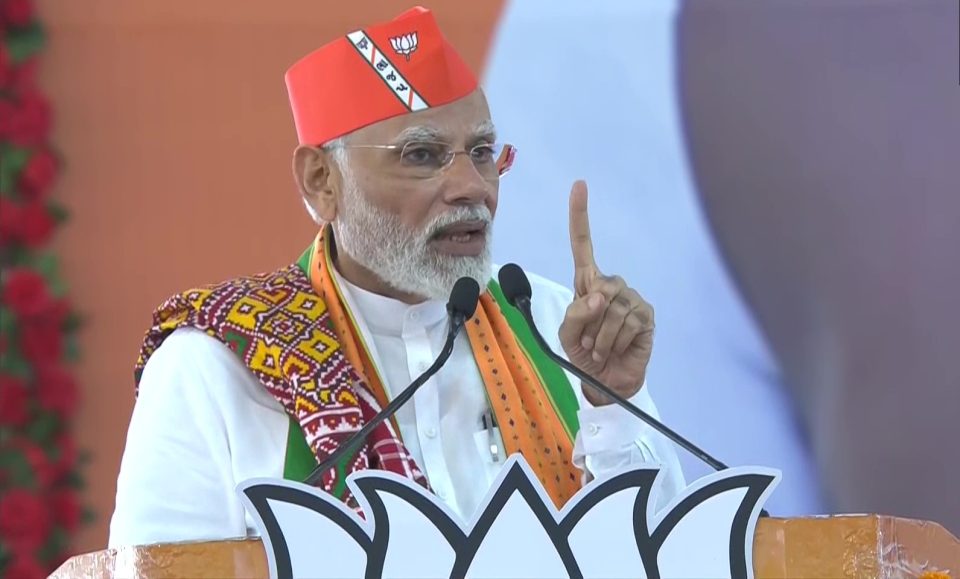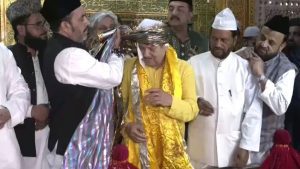
Why Sangh Parivar’s efforts to reach out to Muslims remain hollow
An RSS leader’s visit to a dargah in New Delhi and PM Modi's exhortations to BJP party workers to engage with Pasmanda Muslims are meaningless until they stop vilifying Muslims and clubbing them as one homogenous group

On October 23, a day before Deepavali, Indresh Kumar, a member of the National Executive of the RSS and patron of the organisation’s affiliate, the Muslim Rashtriya Manch, visited the Hazrat Nizamuddin Dargah, New Delhi, and lit earthen lamps inside the premises.
Kumar, the pivotal leader of RSS’s engagements with the Muslim community, offered flowers and chadar at the dargah of the medieval Sufi saint and stated that this festival “erases all the religious differences and the differences between the provinces”. But, he also raked up the organisation’s position on the contentious issue of religious conversions (to Islam) that has been consistently cited for decades by the RSS to arouse majoritarian sentiments.
“No one should be forced to convert” and indulge in violence, he said. The RSS leader asked everyone to “follow their own religion and caste (sic)… When all religions are respected in the country, then the country will be free from the fundamentalists who make stone pelting on Fridays (their practice),” he said, indicating that Kumar was of the view that only Muslims were the stone-pelters. His opinion bracketed Muslims as a homogenous community although this is at odds with a key Sangh Parivar initiative that we shall later examine.
Strong criticism
Despite Kumar reiterating a previously stated position that is the cause of much divisiveness in India, while ostensibly ‘reaching out’ to Muslims, there was considerable criticism of the move from within the Hindu nationalist ecosystem. Some sections among this group were certainly not placated by Kumar’s unambiguous assertion on religious conversions.

“Indresh Kumar visited Nizamuddin Dargah. How can we ask other Hindus to stop going to dargahs when our own leaders are visiting there?” asked a Twitter user, a self-declared “proud Hindu” and “Krishna Bhakt”.
Also Watch: Off the Beaten Track Ep 1: Muslims, Islam & Islamicate culture in Bollywood
Significantly, dargahs are disapproved by orthodox Muslims and traditional followings of these shrines cut across their religious identities.
Another Twitter user vilely commented that the RSS leader had got his khatna (Arabic term for circumcision). For another, Kumar was leading the RSS into servicing Islam in India, although, he said, “Nizamuddin Auliya was not only a believer of Jihad, but also came to India to wage Jihad. Hindus will face the Torment of Hell Fire.”
None of the handles critical of Kumar’s initiative are of public figures associated with Sangh Parivar. Instead, these are anonymous handles that make up the troll army at the disposal of the fraternity to hound or troll adversaries on social media. The anger of individuals who manage these handles is indicative of the extent to which the Hindu nationalists’ driven prejudice against Muslims has spread in society.
Also read: RSS’ Dussehra speech still matters, but it’s losing hold over BJP
Modi’s urging
Slightly more than 100 days prior to Indresh Kumar’s visit to the dargah, Prime Minister Narendra Modi, at the National Executive meeting of the BJP in the first week of July in Hyderabad, asked party workers to engage with the Pasmanda community (OBC and Scheduled Caste Muslims). People from this socio-economic group are among the most deprived within the community. Modi also asked supporters to take out ‘sneh yatras’ (yatras demonstrating affection).
Modi’s goading of the cadre was in the backdrop of domestic uproar and international setback following the offensive statement made by BJP spokesperson Nupur Sharma. His statement was interpreted as an effort to make a new beginning by shedding not just the image of the BJP, but also that of the RSS and its affiliates, as being anti-Muslim outfits.
Events during this crucial period demonstrate, as evident in Kumar’s statement after visiting the Nizamuddin Dargah, that while outwardly the BJP-RSS has made some placatory moves, little effort has been made at moderating the basic premises that lie at the root of their Hindutva-backing supporters viewing Muslim community with suspicion, hate and distrust.
Although the BJP has not yet undertaken mass contact programmes aimed at engaging with Muslims at a societal level (which it routinely does otherwise by means like yatra politics), it organised the first-ever formal sit-down with the Pasmanda community leaders in Uttar Pradesh on October 16, in the state capital, Lucknow.
Inherent contradiction
But such efforts, termed Pasmanda Buddhijeevi Sammelan, are hamstrung by an inherent contradiction. This initiative is based on the idea of the Muslim community’s heterogeneity – that in addition to diversities on lines of sects (Shia-Sunni), Muslims are also divided into different socio-economic groups within a hierarchical order.
The inconsistency in the BJP’s position stems from the fact that while the party and its affiliates accept pluralism among Muslims for their outreach programmes, for the vilification campaigns they run to mobilise majoritarian support, they consider Muslims as a homogenous community.
Also read: After slow ascent, RSS has firm grip on Indian polity for next 25 years
The primary driver of Hindutva politics is to divide society between ‘us’ and ‘them’. As a consequence of this, any initiative that splinters ‘them’ into several smaller groups will not be backed by the majority of Hindutva supporters.
Moreover, such efforts to reach out will also be viewed with suspicion by Pasmanda Muslims because in every identity-based attack by Hindutva votaries, they were the primary targets. They are the most vulnerable, being the poorest Muslims and also because they are socially placed at the bottom of the community’s pyramid.
Economic boycott
The manifestations of the intrinsic limitation of the outreach programme to Pasmanda Muslims are statements like the one made recently by BJP lawmaker Parvesh Sahib Singh Verma, who called for the economic boycott of Muslims.
In the past few years, especially after the COVID-19 pandemic, several campaigns were mounted by the foot soldiers of the Sangh Parivar against Muslim traders, vegetable vendors and small shop owners. Muslims engaged in the trade of meat and poultry have been singled out for attack from even earlier.
Between Modi’s suggestions to party leaders and Indresh Kumar’s Nizamudding visit, the remission of sentences of 11 convicted for the gang rape of Bilkis Bano has been a key development. But if the BJP was remotely serious about engaging with the Pasmanda Muslims, these convicts would not have been released because Bilkis too is a Muslim from this social group.
The additional reason for the BJP’s efforts not being taken at face value lies in the fact that its politics of hate and distrust made Pasmanda Muslim groups primary targets of its politics. The community constitutes an estimated 85-90 per cent of Muslims and comprises those engaged in professions on the margins of economic activity — artisans, those engaged in meat businesses, tailors, barbers, carpenters, weavers, petty traders etc.
More often than not, Muslims physically attacked in the past eight years, either during communal riots, state-led demolitions drives and selectively targeted, were chiefly from these socio-economic groups. It will be impossible for the BJP to woo these communities without abandoning its politics of deepening hate and spreading prejudice.
Contradictions in the Sangh Parivar’s approach to enter into dialogue with Muslims were evident in its choice of select representatives of the Muslim elite for the meeting with sarsanghchalak, Mohan Bhagwat. This group that included former Delhi Lieutenant Governor Najib Jung and former Chief Election Commissioner SY Quraishi was drawn from the socio-economic elite of Muslims.
Appeasement politics
Political parties that are criticised by the BJP for ‘appeasing’ Muslims for decades had engaged with representatives of the same elite. By inviting similar groups who have been treated as Muslim ‘representatives’ despite ignoring interests of the majority within the community, the Sangh Parivar was acting no differently from the other political parties. Consequently, initiatives like the meeting or Bhagwat’s visit to the Delhi mosque, also initiated by Indresh Kumar, are also ‘appeasement’ of a similar nature.
Be it Modi’s call for political engagement with Pasmanda Muslims, or RSS efforts at finding a meeting ground, these shall all come to a naught unless the RSS abandons its strategy of viewing Muslims as a homogenous group. It is time that the RSS and its affiliates, including the BJP, accepted that Muslims are as divided as Hindus are on lines of their caste identities.
This will necessitate the RSS and its affiliates to abandon their argument that Islam in India is a foreign religion. It has to accept that the majority of Muslims embraced Islam over several centuries in the medieval period for a variety of reasons, including the failure to live with dignity as low-caste Hindus.
By constantly spreading the untrue notion of Muslim homogeneity and by depicting every member of the community as those whose loyalties are ‘suspect’, the Sangh Parivar has enlisted a majoritarian electoral vote bank that has ensured the relevance of Muslim voters.
The BJP has prioritised winning elections more than anything else since 2014. The party has consistently won several seats where Muslims are present in significant numbers by use of the strategy of ‘reverse’ polarisation.
As a result, it needs to be examined if the BJP is at all serious about reaching out to Pasmanda Muslims or this is another jumla, or statement for public consumption and to minimise damage to the Prime Minister’s image outside India.
Until the Sangh Parivar campaign of vilifying Muslims and clubbing all of them into one homogenous group is given up, any effort to reach out to select social clusters within the community shall appear hollow.
(Nilanjan Mukhopadhyay is a NCR-based author and journalist. His latest book is The Demolition and the Verdict: Ayodhya and the Project to Reconfigure India. His other books include The RSS: Icons of the Indian Right and Narendra Modi: The Man, The Times. He tweets at @NilanjanUdwin)
(The Federal seeks to present views and opinions from all sides of the spectrum. The information, ideas or opinions in the articles are of the author and do not necessarily reflect the views of The Federal)


